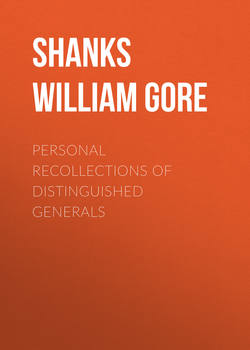Читать книгу Personal Recollections of Distinguished Generals - Shanks William Franklin Gore - Страница 1
ОглавлениеPREFACE
The purpose of this volume is to make more familiar to the general public the actual characters of some of our great military leaders during the late war. I have attempted to portray them not as on parade, but in undress uniform, and to illustrate not only their great military qualities, but more particularly their mental peculiarities and characteristics. These pages will be found to contain many facts about some of the great battles which official reports have left untold, with such recollections of our generals as history proper will not perhaps condescend to record, and to embrace singular facts about great campaigns and strange stories of great men. The portraits are freely drawn. They are made from actual studies, if not special sittings, and while taking care to give every beauty, I have omitted none of the deformities or blemishes of my subjects, though I have told in full detail their virtues, and have touched on their faults and vices lightly. I have avoided alike extreme extravagance in praise or censure. Still there is enough shadow to the pictures to give the necessary, if not agreeable contrast to the lights. The reader must not, however, mistake the stand-point from which I have written. Distance, unfortunately for truth, lends enchantment not only to objects, but to men. The atmosphere of Olympus produces many phantasmagoria, and the great at a distance exist to our eyes in a sort of mirage. The philosophy of perspective as applied to natural objects is reversed when applied to mankind, and there are very few men who do not grow smaller as one approaches them. Most men are pyramidal in shape only, not proportions. "No man is a hero to his valet." Even Jupiter was ridiculous at times to Homer. Very few generals have appeared great to the war correspondents; and though very few of the latter can claim to be descendants of Diogenes, they can assert, with equal positiveness, that very few of the generals have been Alexanders, and that "the very sun shines through them." I have written under the disadvantage of being too near the objects drawn; and those who do not know the subjects as well may imagine I have made them undeservedly Liliputian in dimensions.
Writing contemporaneous history is the most thankless of tasks, and I discover also one of the least independent of labors. Still I have not written with a goose-quill, and there has been some gall in my ink, yet I do not think I have any thing in the ensuing chapters to blot. I do not think I have done any man injustice. I have written many sentences and made many assertions which will doubtless be termed strong, but in writing these I am only the amanuensis of truth; and I write with the firm belief that "historical truth should be only less sacred than religious truth."
I have no doubt, however, that others will think differently after perusing the book. When publishing in Harper's Magazine I was told that the language of some of these sketches offended the subjects, but I have been unable to find any fact that ought to be stated otherwise. I think it best to say, for the benefit of all who may choose to object or condemn the volume as now published, that I have written nothing that I do not believe to be true – I trust not one sentence that, dying, I would wish to blot, and certainly not one word that, living, I intend to retract.
New York, Sept., 1866.
